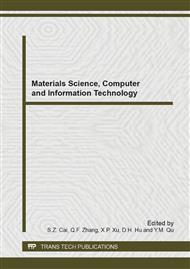p.1756
p.1762
p.1766
p.1770
p.1775
p.1779
p.1782
p.1786
p.1790
A Fuzzy Clustering Algorithm of Web Customers Based on Attributes Reduction
Abstract:
The evaluation algorithm is based on the attributes of data objects. There is a certain correlation between attributes, and attributes are divided into key attributes and secondary attributes. This paper proposes an algorithm of attribute reduction based on rough set and the clustering algorithm based on fuzzy set. The algorithm of attributes reduction based on rough set is described in detail first. There are a lot of uncertain data of customer clustering, so traditional method of classification to the incomplete data will be very complex. Clustering algorithm based on fuzzy set can improve the reliability and accuracy of web customers.
Info:
Periodical:
Pages:
1775-1778
Citation:
Online since:
July 2014
Authors:
Price:
Сopyright:
© 2014 Trans Tech Publications Ltd. All Rights Reserved
Share:
Citation:


